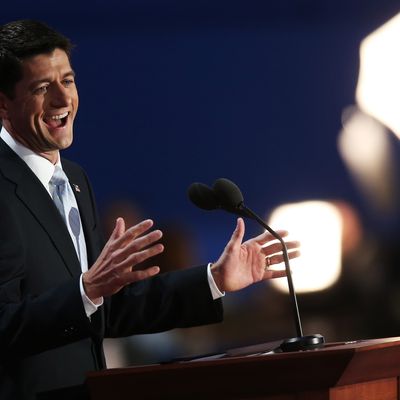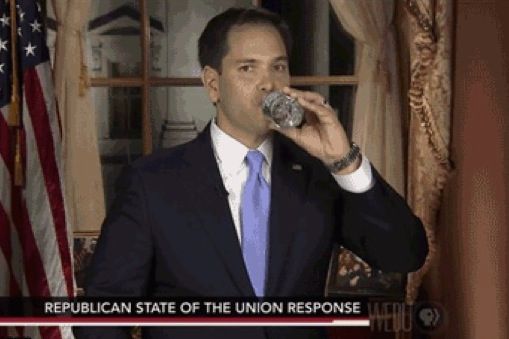
“Poverty,” reports the New York Times, “is suddenly the subject of bipartisan embrace.” Before poor people get too excited about this new development, some clarification may be in order. The parties are not embracing a shared program to alleviate poverty, nor even the goal of doing something at all about poverty anytime soon. There is merely shared agreement to discuss poverty as a subject.
What hasn’t changed is the general shape of the Republican economic agenda in either the long run or the short run. Republicans agree that government takes too much from the rich and gives too much to the non-rich, and its domestic agenda is constructed largely as a corrective to what Republicans see as excessive redistribution. Republicans also believe that nothing about the immediate labor market requires any changes to their general economic policies. (That is, they don’t believe high unemployment justifies temporarily relaxing their opposition to deficit spending or to worry less about coddling the unemployed.)
The near-term agenda remains completely unaltered. Republicans remain unified in their desire to cut food stamps and end emergency unemployment benefits unless offset by other cuts to domestic spending. Nearly all support ongoing state-based campaigns to deny Medicaid coverage to uninsured people too poor to qualify for tax credits to buy private insurance.
The awkwardness of the current moment is that Republicans have yet to agree on any kind of alternative policy framework for anti-poverty policy, and in the meantime they are still waging a current legislative fight to roll back existing income support for the poor and block a minimum-wage increase. When forced to defend these positions, they are making the odd argument that being poor stinks.
“You don’t dream when you’ve got food stamps,” says Paul Ryan. [Correction: this statement comes from an ally of Ryan’s, not Ryan himself. My apologies for the error.] Neither can you dream when you’re collecting UI: “Even if you had an extension for three months, what are you doing to solve the broad picture of the economy and creating jobs,” said Senator Jerry Moran. For that matter, even low-wage jobs are no picnic, either. “Raising the minimum wage may poll well, but having a job that pays $10 an hour is not the American dream,” says Marco Rubio.
It is certainly true that being unemployed, or poor enough to qualify for food stamps, or making the minimum wage is no fun. Everybody agrees that faster economic growth, low unemployment, and higher wages would make people happier than being poor. The question is, given the actual labor market, why would withholding benefits from unemployed workers create jobs when jobs are so scarce? Few Republicans care to address that question straightforwardly. That is the void the still-theoretical Republican poverty agenda is meant to fill.
This is not to deny that some policy revision is going on. Republicans do appear to be undertaking some rethinking of the policy design of programs that aid the poor. Marco Rubio recently delivered a speech making some generalized proposals along these lines, and Paul Ryan is promising proposals of his own. But the general shape of the Republican agenda tightly circumscribes any potential reforms. For instance, Rubio proposed, without specifying any specific dollar amounts, to channel more of the Earned Income Tax Credit to childless adults. But Rubio’s office also says he plans to keep the total budget of the program constant, which means he would have to cut the existing work subsidy for low-income parents.

Even holding the spending levels constant would be impossible within the context of Republican budget math. The Paul Ryan budget – the party’s unifying vision statement – gets two thirds of its budget cuts over the next decade from programs for the poor or near-poor. The Ryan budget primarily is a plan to reduce income support for the poor. Abandoning those cuts would force the party to completely abandon its fiscal goals, unless Republicans decide either to increase taxes, cut defense, or cut benefits for current retirees, which they won’t.
There’s no evidence Ryan has changed his belief that cutting income support for the poor is ipso facto good. As he has has put it, the safety net is a “hammock which lulls able-bodied people into lives of complacency and dependency.” Reducing the generosity of that safety net will encourage the poor to make something of themselves. In his most recent interview on poverty, last night with NBC, he hit all the same talking points about dependency, and the failed war on poverty, and how personal charity will fill in the gap.
The main unanswered question for the Republicans professing deep concern for the poor is, why wait? Two possible answers spring to mind. The first is that the new Republican vision is perfectly compatible with the old Republican vision: The poor and unemployed mainly need a good kick in the ass. Today’s Republican poverty agenda is therefore a nice down payment on tomorrow’s.
The second possibility is that Republicans really do have a different, less punitive vision in mind for their treatment of the poor. But if that is the case, it is hard to explain why they are fighting for a blunt policy of cutting right now. If Republicans care so much about the poor and unemployed, why inflict further misery on them right now while the party leisurely draws up a grand new vision for the welfare state? If Republicans only care about poverty policy insofar as they can use it to rebrand their party for 2016, it seems fair to conclude that they don’t actually care about it at all.






























